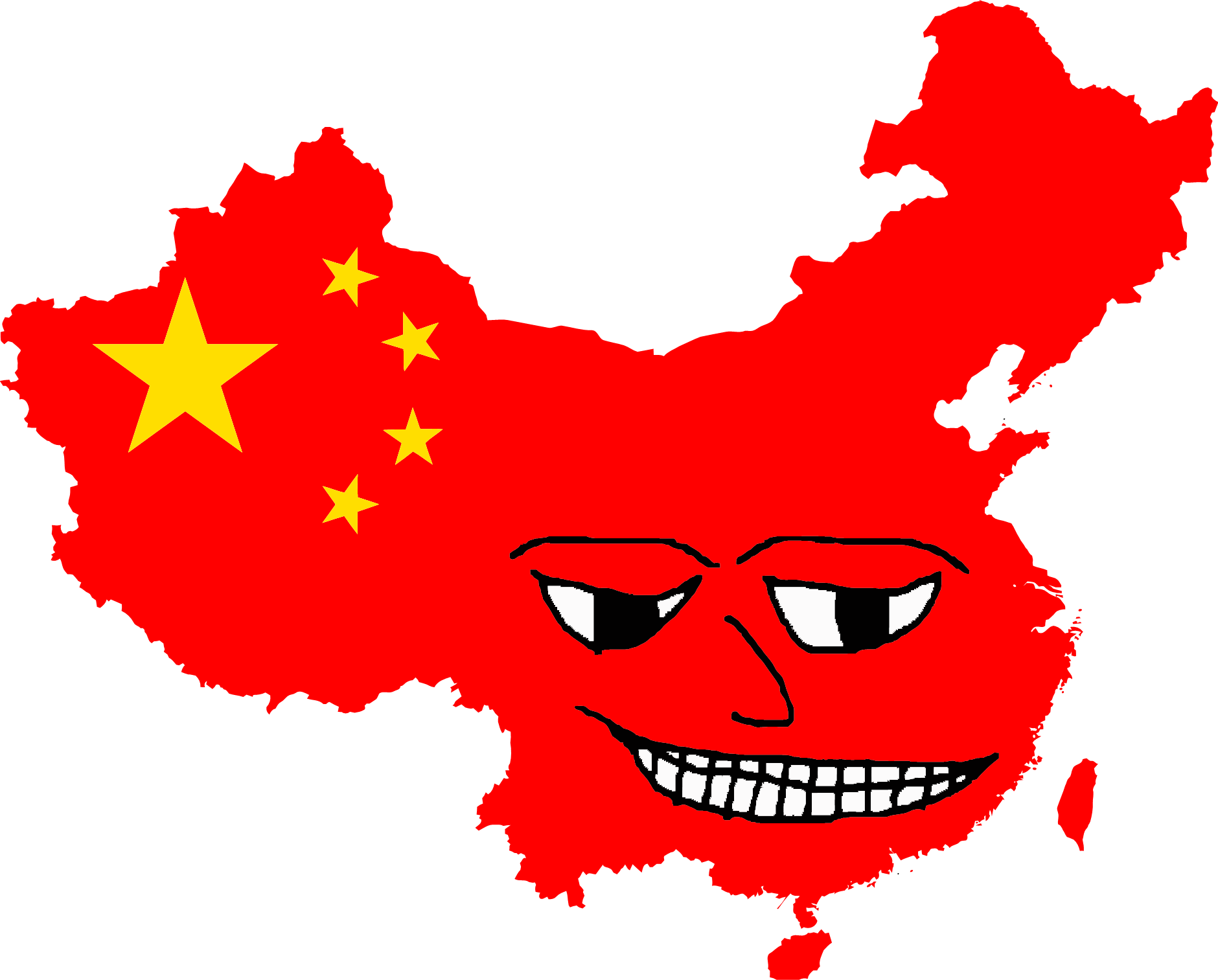One of the biggest failings in Western economics is the prevalence for across the board percentage pay rises. People getting paid £40k get double those on £20k when both get an equal amount in pay percentage increase. This has been part of the reason why top bands in large companies have gained such huge pay scales. Percentage rises are nothing like an equal pay rise. It is way past time unions recognised this.
Kind of Kudos to the Chinese for this. I hope they see fit to roll it out among some of the more powerful families in China also, and not just use it to claw back some money from the middle class.
The other half of the problem is if a CEO ever said “We’re going to have lower profits this quarter because we started paying everyone more” that CEO will be locked out and that’s if the people making those decisions aren’t sued first by the board
Sharehoarders are the biggest issue



something’s up with this map…
Can’t argue with this if it’s actually executed the way its being suggested. Good move, CCP.

This is the best summary I could come up with:
BEIJING, Aug 14 (Reuters) - Bank of China Ltd (601988.SS), China’s fourth-largest lender by assets, has launched a countrywide exercise to reduce the salary gaps among its employees and mid- and high-level managers in response to Beijing’s “common prosperity” drive, three sources with knowledge of the matter said.
President Xi Jinping launched the common prosperity drive in 2021 as an effort to reduce income inequality, which could threaten long-term economic growth and even the legitimacy of Communist Party rule.
The move follows pay cuts being made at investment banks such as China International Capital Corp (CICC) (3908.HK).
Commercial banks have suffered record low profit margins due to disruptions from the embattled property sector and local government debt risks in a faltering economy.
The sources said Bank of China has launched an internal “salary management system reform plan”, after an inspection team under the Central Commission for Discipline Inspection found the bank’s pay system has issues of “wealth inequality” in several rounds of investigations since late last year.
The move also comes as a surprise to state bankers, who generally earn less than peers at investment banks and other local financial institutions and who were spared from pay cuts last year after Beijing called for the promotion of common prosperity.
I’m a bot and I’m open source!
President Xi Jinping launched the common prosperity drive in 2021 as an effort to reduce income inequality, which could threaten long-term economic growth and even the legitimacy of Communist Party rule.
They tell on themselves every single time.
-
Infinite growth is neither possible nor necessary for a prosperous society.
-
As a society reaches a sufficient level of prosperity, the need for the state to coerce its citizens by force becomes less necessary over time. Or in capitalist parlance, “this threatens the legitimacy of the state”. They can’t imagine a stateless society because they envision they will always need a monopoly on violence.
On point 2 are you saying China is willing to relinquish it’s monopoly on violence and is moving to become stateless? I honestly cannot see China or any other country for that matter doing that willingly.
Sorry, but this
might beis a wall of text so: TL;DR possibly, but it will likely take several decades of disciplined party rule.The legitimacy of a state seems to derive itself in different ways. The U.S. for example, claiming to be a liberal democracy, derives its legitimacy from the beliefs of free press and fair elections (among other things). For this reason, it is very important to protect voting rights, demonstrate that the elections are fair, and give everyone a chance to share their views…or at least make it seem so, depending on your perspective.
China, claiming to be a society that is trying to achieve communism, derives its legitimacy from following the tenets of Marxist-Leninist theory (with Chinese characteristics). For this reason, it is very important for the CCP to provide common prosperity for all, and eliminate poverty entirely…or at least make it seem so, depending on your perspective.
So, one of the theories of communism is that as society becomes sufficiently prosperous, the citizens will no longer need to be coerced by the violence of the state to do what is right for the state. With the removal of the class structure, all of society can work toward common goals because the goals of the individual become the goals of society. The state will gradually wither away because its function will have been performed.
If one were to believe the CCP is acting honestly (which is a big ask on Lemmy), they claim to be trying to achieve a modern socialist state by 2049 that is “prosperous, strong, democratic, culturally advanced and harmonious”. In my perspective, those conditions would then theoretically allow for the eventual withering of the state.
Now, if you wanted to analyze whether a government were truly acting toward their stated goals, you would start by seeing if their actions lead to those goals, right? We’re looking for positive evidence. So here’s the quote:
President Xi Jinping launched the common prosperity drive in 2021 as an effort to reduce income inequality, which could threaten long-term economic growth and even the legitimacy of Communist Party rule.
We see in the article that China has 1) launched a “common prosperity drive” to reduce inequality, and 2) the banks have implemented the policy and closed the income gap. This is perfectly in line with the goals of a communist state. It even shows banks being subservient to the will of the party. For me, this is one data point of evidence that the CCP is telling the truth about their plans. They are acting in line with their stated goals, and that path ends with the withering of the state - in theory.
I hope that answers your question, and the rest is just a side note.
Do you notice the analysis of the article that closing the income gap “could threaten long-term economic growth and even the legitimacy of Communist Party rule.”?
They are showing their whole ass. A true communist party would not value long term economic growth over common prosperity. And why would that question their legitimacy? If anything, closing the income gap at the expense of growth bolsters the legitimacy of the Communist Party.
The article is viewing China through a capitalist lens! A capitalist state values efficiency and infinite growth above all else. A state that values “income equality” and “common prosperity” IS questioning its own legitimacy! It should instead be acting more efficiently and funneling wealth to the top - equality be damned.
So why does the U.S., a liberal democracy, allow such press? It values free press! Free press gives the people information to make their own decisions, which they use to form political opinions. They use these opinions to vote, and the legitimacy of the state is upheld.
And that’s fine, right? Reuters has a capitalist lens, so it informs people from that perspective. It’s owned by a family of billionaires after all. But then, so are all the other mass media companies in America. All mass media has a capitalist perspective.
And who do you elect when all of your views are informed by capitalists? Anyone who will offer them as much growth as possible. And why is this a bad thing? Because the vast majority of Americans do not have the same relationship to the economy as capitalists do. They are in different classes.
The media structure of the state is not subservient to the state, but rather the opposite. So then which ideology is really running the show here?
The antagonisms between class interests will only heighten as wealth concetrates into fewer and fewer hands. Over time, more and more people will realize that the goals of their class are incompatible with the goals of the ruling class.
The CCP, for good or bad, likely sees this analysis as well. Liberal democracies allow for capitalist capture. They’ve apparently learned the lesson that media must be subservient to the state and that capitalism must be subservient to the state. The Great Firewall and the nationalization of industries reflect that.
-
Credit where credit is due: great initiative, let’s see how it’s executed and maybe learn a thing or two from it
Why do pay cuts for managers instead of pay raises for other employees? How is a cut helping anyone?
Did you even read the article? The article says the plan includes raises for the lower and middle paid employees that is being paid for by cuts to the upper executives. So they’re doing exactly what you proposed
Under the plan, the salary package for employees below mid-level managers was raised by about 10% to 15%, and salaries for higher-level managers were reduced by a similar range, a second source said.
I read the summary. This is good!
Why do high-level managers need help?
Cutting their wages leaves more money to pay workers at the bottom.
They will argue. Pay rise for everyone. Will nject huge amounts of money into the econ. Raising inflation. While this means the low earners gain or lose little. Amd the rich lose much.
It will totally destroy those that cannot work or earn at all. IE retired poor or unemployed.
Should be fine tbh, China actually had a bit of shrinking of consumer spending recently so this is well timed.
Issue is 2 fold.
One. Lets face it. No econ can handle such a huge raise in income. Without it seriously effecting the internal market.
And that huge increase will slowly if at all move to those not currently earning. IE retired or disabled etc.
But even if the econ could manage it. By for example borrowing to raise unemployed incomes while things settle.
Those making the decisions will worry more about the effect on their econ and currency compared to other nations. Not doing the same thing.
In genral governments tend to ( to some extent rightly) value their currencies buying power with other nations. More then the internal markets.
At this time in history. No nation is truly 100% self sufficient. Mainly most nations over the last 50 years have not tried to be. So it can be seen as governments own choice.
But huge changes in the value of a currency has a huge negative effect on the ability for any nations citizen’s to thrive.
This not only effects the poor drematically. But often more to the worry of governments. The rich and government spending power overall.
The later is a death blow for democratic nations. But even more so for a nation that has been using its buying power to position itself in the world for decades. Such as China.












